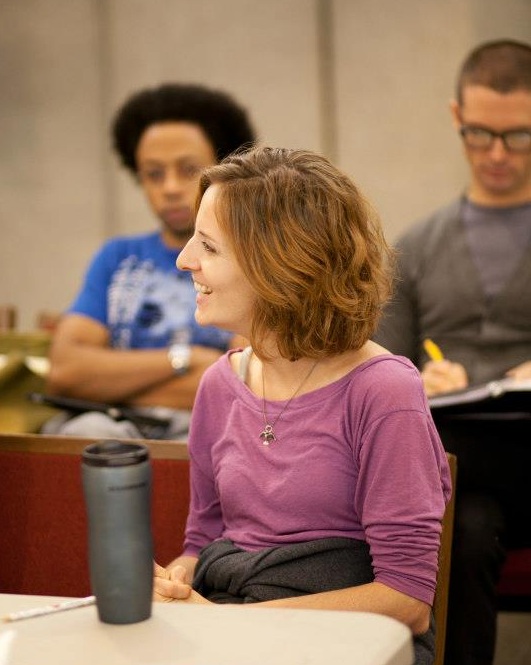Where I Write
(This post was originally published by The Public Theater.)
As I pulled into the dark driveway of the remote mountain cottage, I heard the deep aggressive bark of what sounded like a very large dog. It occurred to me that, considering my wilderness location, the bark actually could belong to a wolf. I saw the doe at about the same time that she saw me. I was still in the car, but my interior light had come on, and so maybe it’s reasonable to believe that she looked me in the eyes, as I imagined. It was early January and I’d never been to this place before. There was snow and ice on the ground, and as I stared at the frightened deer, I questioned the maturity of my decision to come here alone.
Writing space became a sacred thing to me after giving birth to my daughter, Kansas, which I did smack dab in the middle of my time in the EWG. At that time, the EWG was the biggest break I’d had, and so I was obsessively determined to keep up despite my pregnancy, 33 hour labor, and subsequent sleep deprivation. Every weekday morning I woke up at 6am, breast fed my daughter, put on a hat, shoes, and hoodie, and walked three blocks to a nearby Fort Greene diner. I ordered one egg, grits, toast, coffee (which cost me $4.50), and I wrote for two hours. I had to be home by 9am, when my husband’s animators arrived in our apartment to begin working. Before giving birth, my best writing time was in the evenings. But after my daughter was born, I grew to love those early morning writing sessions. I craved them. I did good writing there. And when that diner shut down two years later, I genuinely grieved.
When we moved from Fort Greene to Weehawken (coincidentally shortly after the diner closed), my writing was thrown off because I no longer had a writing space. Don’t get me wrong, I still wrote, but I was like a nomad searching for a writing home. I tried Dunkin Donuts, Starbucks, a wine bar, another local diner, a local reading garden, nothing stuck. Thus, the insane pilgrimage to the scary mountain cottage.
So, I summoned the courage to get out of my car and go into the cabin. It was breathtakingly perfect, a small one bedroom literally sitting on a lake. The entire wall facing the lake was glass, and it offered a stunning view of glistening water, imposing rock, and mysterious forest. But the initial wave of romantic inspiration exploded into horror-movie-terror when I found that I had no cell phone coverage and no internet. There was a land line phone on top of a charming hope chest, but when I listened to the receiver, it was dead. I had wanted writing solitude; I got it. I felt like the cabin was challenging me: “how bad do you want this?” So I stuck it out and I slept with the fire extinguisher beside my bed–the only weapon-like object I could rummage.
That cabin and I became very intimate. It not only became part of the life of the play I was writing, it became part of my life as a writer. I went back there one more time after that initial trip, and then the person who had provided the space for me let go of the lease, and so again, I was in writing-space-mourning.
I’ve found that when I’m writing the first draft of a new story, I need a sacred space. It needs to be private, and it needs to be big enough for me to walk around, and do jumping jacks, and execute my ritualistic giant-sticky-note story development process.
I’m an alumna of the O’Neill, and my experience there with my musical Son of a Gun was so artistically transformative to me that I journey back to their campus every chance I get. There is a spirit there that not only provides time and space to write, but also an incredible amount of emotional support for the writer, which makes me tear up even as I write this. Last weekend I artificially generated my own writing retreat by booking a Montclair space on Airbnb. It was a lovely space, but it wasn’t sacred.
When I’m in revisions mode, I can work anywhere. I can work at home with Power Rangers playing in the background. I can work in my office at The King’s College with students dropping by for personal advice or to use my French press. But the initial stages in a project have to feel indulgent, like I’m treating myself to something I don’t really deserve, or maybe something that the project itself hasn’t quite earned yet. Now that I write this, it occurs to me that perhaps making a sacred space for a project is an act of faith–a way of saying, “I believe in this even before there is anything for me to believe in.” It’s a tithe, a mass, a making space for the something that is to come, not unlike preparing a nursery.
Chris Cragin-Day is currently working on two commissions–her play titled Martin Luther on Trial and a Christmas musical which she will co-write with Don Chaffer, her Son of a Gun collaborator. Her musical adaptation of Wilde’s The Selfish Giant, co-written with Michael Castillejos, played in Firebone’s Long Long Ago Festival this past December.
